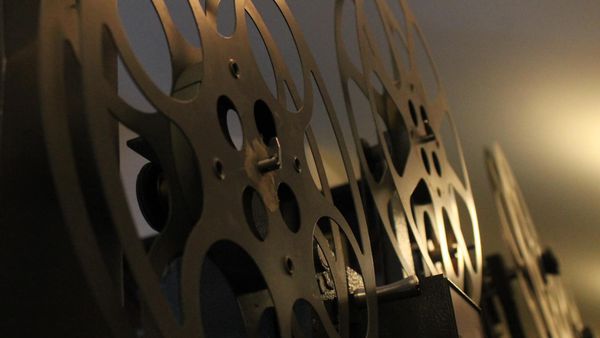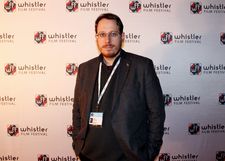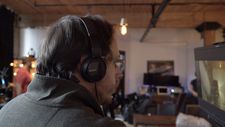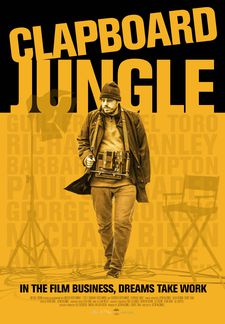 |
| Clapboard Jungle: Surviving The Independent Film Business |
A couple of years ago, Justin McConnell took his highly distinctive horror film, Lifechanger, to Fantasia - we spoke to star Lora Burke about it. This year he’s back with a very different film – Clapboard Jungle, which is also set to screen at Frightfest. It’s a documentary about the film industry which loosely follows his journey in making and promoting Lifechanger, with lots of good advice for people at the start of their own filmmaking careers and an astounding number of big name interviewees, from Guillermo Del Toro to George Romero, Michael Biehn, Lloyd Kaufman and Fantasia’s own Mitch Davis. Shortly before all the chaos of the festival began, he and I connected and I asked him how much the film stemmed from his journey with Lifechanger or if it was a project he had felt drawn to separately from that.
 |
| Justin McConnell |
“Oh, it was separate from that. I started doing this in 2014, when I hadn’t even had the idea for Lifechanger in my head. Essentially what had happened was, I had just finished my last documentary, Skullworld – that came out in 2013. With the documentaries I’ve made, because I don’t have access to much funding for them, they were projects I could do out of my own pocket, in my spare time. It was almost a hobby that just happens to turn into a feature film that I release a couple of years later.
“So in early 2014 I figured because of my position in the industry – it’s nothing special or huge or anything but I did have access to a number of people – and I’m a programmer for a film festival and I work in post-production and I was trying to get movies made. I figured this would be a pretty interesting approach.”
He initially considered using somebody else’s film to anchor the documentary, he says, because he didn’t want to make a vanity project, but ended up opting to use his own film after all because following somebody else would simply have been too expensive.
“It’s difficult to have any degree of subjectivity and distance from the subject matter when you yourself are the subject matter, so I started surrounding myself with a bit of a team to call me on my shit. I didn’t want it to be a self-serving doc. I wanted to use the most honest assessment of myself as I could, and my position in the industry, as a backbone and a skeleton to hang all of the interviews off of, so that there would be a bit of an arc and a narrative, so it wasn’t just talking heads.
“Gradually over time I started collecting more and more interviews and the project grew and grew. I ended up with about 350 hours of raw footage and 120 interviews, so it expanded into an eight episode educational series as well. Every episode is a topic. It’s not about me – that is the talking heads side of it.
 |
| On the road |
“I had a little bit of pocket change to start with and then I would just keep pumping little bits of money into it as I travelled over the years with my own projects, until I felt like I had enough material for a solid reflection on what it’s like to be an independent filmmaker.”
He’s worked in a lot of different roles in the film industry, from editing to cinematography to sound design. Was that helpful when it came to this project?
“Yeah, absolutely,” he says. “I’ve diversified a lot over the years, and a lot of that was just in order to keep food on the table. Beyond that, I’ve been trying to get my own stuff made and financed and sold, and because I’m right in the thick of all that stuff, it did give me a certain degree of insight into how I could tell the story in a way that I would have wanted it told to me when I was younger. The goal of this was to create a resource, an asset, that would be like a film school in a box for people like I would have been ten years ago or 15 yeas ago. I’ve still not come that far – it’s a constant ladder and people at all different levels of it are still climbing and they’re still learning.”
It’s strange that the myth of people making films and getting rich quick still persists, I note.
“Yeah – but also I think that since digital filmmaking democratised everything over the past 20 years there’s a lot more working class filmmakers, or people who dropped a couple of thousand dollars on a camera body and a few lenses and are able to make a feature film now. That might have been their life savings, the 20 grand they spent on their first calling card film, but that calling card film can then get released and they travel around the world to festivals and get put up in nice hotels and flown everywhere, driven around in cars and stuff like that if it’s the right film, if it’s successful, so you’re then on red carpets and people think oh, you must be living this extravagant lifestyle... You can make a film and get this incredible high of gong on the festival circuit and winning awards and stuff, but that doesn’t mean that you’re eating any better than anybody else.”
 |
| Contributor Guillermo Del Toro |
Clapboard Jungle has quite a strong genre focus. Did he intend it primarily for a genre audience or does he hope that it will reach – and help – budding filmmakers more generally?
“I think it’s useful to indie filmmakers in general but I focused on genre talent mostly because that’s who I have the easiest access to. If I went to a festival or a market, those were the people who would also attend those festivals or markets and would take half an hour out of their day to sit down with me... but we’re all trying to tell stories and we’re all trying to create art, and whether there’s an exploding head in it or a dramatic, slow ‘your family’s dying’ kind of Southern drama or something, it’s still everybody trying get what’s in their head and in their heart out to a screen and to an audience.”
Did he find that his interviewees were enthusiastic about helping new people?
“Yeah. Especially older filmmakers. They switch to a teacher brain. They sort of want to pass down what they learned and you have some incredible long conversations with incredibly articulate people... I think it’s incredibly important to approach everybody without preconceived notions, the sort of fanboy approach. You know, I’m sitting in a room with people whose work I grew up watching and they’re pat of the reason I’m making movies and I sort of have to detach the fan in my head from that and just talk to them as a person, because ultimately they are all just human beings. They have the same troubles and challenges that everybody else does.”
With so much footage collected over all these years, how did he know where to begin when it came to editing?
“It was very difficult!” He laughs. “Luckily I had a very good organisational system with what I shot. Everything was very clearly labelled. In terms of editing, it was a long process. I had an assistant editor working with me, named Alyssa Barco, and what her job was was to sit down for three or four months and sort every single interview clip by topic into 30 or 35 timelines, just so that as we were editing, if we needed to support a certain topic in the arc of the story or whatever we were working on, we knew there was a timeline for crowdfunding, we knew there was a timeline for pre-sales versus other kinds of sales. Just very specific topics.
 |
| In the editing room |
“We didn’t really have time to do a paper edit, where you transcribe every single interview and treat it like a catalogue and organise it all visually in front of you, which a lot of other documentaries do. We had no budget for that because the amount of footage we’d need to transcribe would be ridiculous.
“Once we had all that, I hired and editor named Kevin Burke – who directed the movie 24x36: A Movie About Movie Posters – and we started working on an assembly. The initial cut was about two hours and then over time we started whittling it down. I think he started working on it in 2018, when I was doing festivals with Lifechanger, so we didn’t really have the ending locked down. I think we locked picture just before Covid-19 hit in January this year, then final post was done by the end of February. So it was a long process. We’re still not done because we’re currently in post-production on the eight episode series, and then there’s going to be extended content beyond that... I don’t wish documentary editing on my worst enemy, yet somehow I do it. I don’t know why. It’s a masochistic streak. But at the end of the day you end up with – hopefully – something interesting for people.”
Since it screened at Fantasia, Lifechanger has enjoyed a good deal of success. it was released on DVD and Blu-ray in early 2019 and was later picked up by Netflix in several territories.
“We ended up being the number one movie on Netflix for a couple of days, which was kind of insane for a movie that was tiny,” he says happily, and explains that it was subsequently picked up by Sky Movies and Showtime. “It did pretty well for this tiny film that it is, and I’m pretty proud of that.”
 |
| Clapboard Jungle poster |
Being back at Fantasia this year, with a very different film, feels a little surreal, he says. “I’ve first hand experience of what this feels like already because we world premièred with the Canadian Film Festival earlier this year, in June, which was a broadcast across Canada on Superchannel. So my world première on this film was me sitting alone in my apartment having a glass of scotch and getting Facebook messages throughout the night like ‘Hey! Good job!’ it’s such a different experience to an actual première where you’ve got a full audience of people at something like Fantasia where the energy is just there and you can talk to people in a pub afterwards.”
The monthly short film festival that he runs, Little Terrors, is on hold at the moment, but he does have some things he can get on with, such as post-production work for clients.
“In terms of stuff for myself, I’m writing a new script to add to my drawer of scripts – I’ve got around 15 or 20 of them – it’s the classic you keep writing stuff and then one day, hopefully, they’ll get made, kind of thing. In early July I shot an isolation short film in which I tasked myself to do every single department because I’m living alone – including and the score – and that was completed a couple of weeks ago and it’s already gotten into some festivals. It might actually be online by the end of the month, depending on a contest that I entered.
“I used to make electronic music in the early 200s and I was in a metal band for a couple of years, and then for about a decade I didn’t make any music at all. I didn’t really lose the taste for it, I just got busy with film pursuits and everything else, but this situation has put me in the mindset to start writing music again so I’m working on an album.”
Clapboard Jungle is available at Fantasia on demand and is screening at Frightfest on 30 August.





















